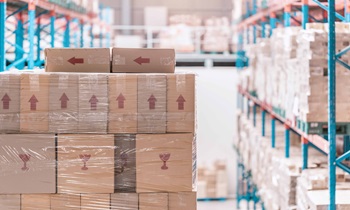Jul 30, 2021
By Andy Harig, Vice President of Tax, Trade and Sustainability Policy, FMI and Elizabeth Tansing, Senior Director, State Government Relations, FMI

Taiichi Ohno created the concept of “just-in-time” (JIT) inventory management. Today, businesses in many industries, including the grocery industry, employ JIT to oversee production schedules and mitigate waste. Businesses do their best to forecast what products they will need against when they are most likely to sell them.
In the grocery industry, inventory stockpiling can be an important hedge, but it can also be a costly one. Apart from production issues and supply chain bottlenecks that make securing large quantities of products more challenging for retailers, one important reason grocers don’t typically stockpile large quantities of products is because of the tax implications of doing so. Put simply, big inventories mean big money left on the table.
A number of states have laws in place that tax inventory. We recently published an analysis that outlines various laws across the country requiring companies to pay taxes on inventory. For example, Arkansas, Georgia, Kentucky, Louisiana, Mississippi, Oklahoma, Rhode Island, Texas, Virginia, and West Virginia all have inventory laws on the books. In Maryland, there is a tax on business-owned personal property, including inventory, which is imposed and collected by local governments. Like Maryland, localities collect the inventory tax in Georgia. In Alaska, 15 of 19 boroughs levy a property tax and some may include an inventory tax.
At the federal level, businesses cannot deduct the cost of inventory until the inventory is actually sold. The IRS does allow the use of the last-in, first-out (LIFO) method of inventory accounting. LIFO helps protect against inventory price shocks that can result from inflation and is an important tool that creates consistency, aids in long term planning, and reduces the tax burden of businesses during periods of inflation.
In the early stages of the COVID-19 pandemic, a lot of assumptions about inventory management were put to the test. Shoppers across the country experienced empty shelves at their grocery stores for items we all use to keep ourselves and our homes clean, like hand sanitizer, bleach and personal hygiene products.
To prevent those kinds of shortages from happening again, you might be asking yourself, “Why couldn’t grocery stores act as shoppers did and stockpile items they know will be in high demand by consumers?” This question seems more urgent as inflation is driving up the cost of goods well beyond food and CPG products. The truth is retailers are adjusting – and always have adjusted – inventories as prices and other supply factors change. Recent press coverage of so-called “retail stockpiling” is presenting these efforts as a unique response to COVID and potentially a fundamental change to long-standing business models; but using inventory as a hedge against inflation is nothing new and represents the same kind of nimble inventory control as just-in-time does.
Ultimately, good inventory management is essential for any business, as Taiichi Ohno recognized years ago. The competition in the food industry is fierce, and grocers are always looking for ways to keep their prices down to maintain an edge over their competitors. However, the tax implications of stockpiling large quantities of inventory often means “just in time” delivery makes the most business sense and potentially will for the foreseeable future.
Read FMI’s Analysis on Inventory Taxes (Member Login Required)


 Industry Topics address your specific area of expertise with resources, reports, events and more.
Industry Topics address your specific area of expertise with resources, reports, events and more.
 Our Research covers consumer behavior and retail operation benchmarks so you can make informed business decisions.
Our Research covers consumer behavior and retail operation benchmarks so you can make informed business decisions.
 Events and Education including online and in-person help you advance your food retail career.
Events and Education including online and in-person help you advance your food retail career.
 Food Safety training, resources and guidance that help you create a company food safety culture.
Food Safety training, resources and guidance that help you create a company food safety culture.
 Government Affairs work — federal and state — on the latest food industry policy, regulatory and legislative issues.
Government Affairs work — federal and state — on the latest food industry policy, regulatory and legislative issues.
 Get Involved. From industry awards to newsletters and committees, these resources help you take advantage of your membership.
Get Involved. From industry awards to newsletters and committees, these resources help you take advantage of your membership.
 Best practices, guidance documents, infographics, signage and more for the food industry on the COVID-19 pandemic.
Best practices, guidance documents, infographics, signage and more for the food industry on the COVID-19 pandemic.
